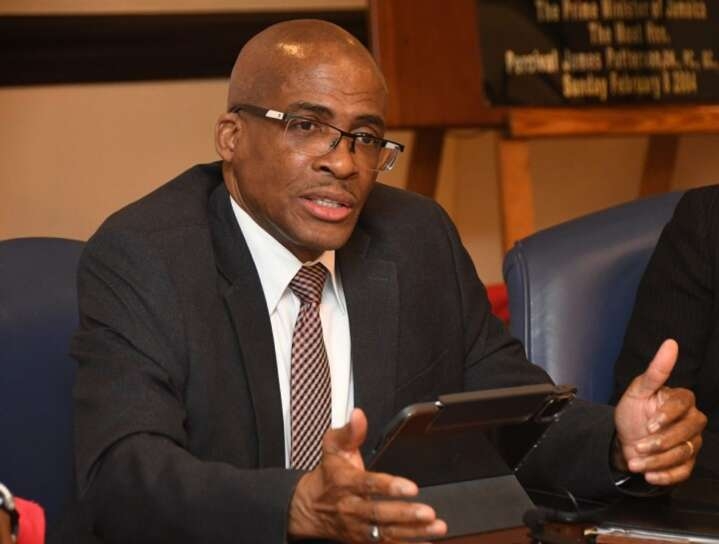Financial Investigations Division (FID) Chief Technical Director Selvin Haye says Thursday's Privy Council judgment backing Jamaica's anti-money laundering regime, which compels attorneys to report instances of financial crimes when dealing with their clients, is a positive for the agency which ferrets out financial crimes.
"The ruling mentions the FID's responsibility as the designated authority, so naturally it would have an impact. Positive or otherwise, it would have had an impact on how we go about business," Haye said.
The FID honcho said while he was yet to read the ruling in its fullness or hold discussions with the FID's attorneys, "from the outset it is something positive, based on what we have to do".
"The attorneys will help us unpack it, so we will discuss it as a management team and then we will see how we move forward. Suspicious transactions and fraud and everything have been ongoing; we are in part an investigative body that has been treating with these cases, so we continue. This ruling really specifies the attorneys being fully required to report and be part of the regime without the issues that they were raising about the constitutionality of it, so the ruling would smooth the way for us to move forward," Haye said.
In the meantime, Finance Minister Dr Nigel Clarke, in a statement issued in the wake of the ruling, said the "decision represents the firm commitment and resolve of the Government of Jamaica to bring its Anti-Money Laundering/Combating of Terrorism Financing (AML/CFT) regime into compliance with international standards".
"As such, the decision is a game-changer in Jamaica's efforts to ensure that the financial system is not abused to launder the proceeds of criminal activity," Clarke stated, adding that "Jamaica will now move with expedition to ensure that attorneys-at law fulfil their obligations under the Proceeds of Crime Act (POCA) as part of the designated non-financial businesses and professions framework, in preventing the abuse of the financial system by criminals seeking to launder illicit proceeds".
He noted further that the decision enables the General Legal Council (GLC) to resume its role of monitoring compliance by attorneys and as the first step, with support from Jamaica's AML/CFT Prime Contact Secretariat at the Bank of Jamaica, to resensitise attorneys particularly with regard to the suspicious transaction reporting regime.
In 2013 Jamaica extended its anti-money laundering regime to include attorneys carrying out certain activities, such as purchasing and selling businesses or real estate or creating companies or trusts. The Jamaican Bar Association, which represents attorneys, had brought a challenge to the extended regime on the basis that it is unconstitutional on a number of grounds.
A three-judge panel of the Supreme Court of Judicature of Jamaica had held that the relevant legislation was lawful and so dismissed the challenge. However, on appeal the Court of Appeal of Jamaica declared certain aspects of the regime invalid on the basis that they contravened the constitutional rights to privacy, liberty and freedom from search of property without demonstrable justification.
The attorney general and the GLC appealed to Judicial Committee of the Privy Council with the permission of the Court of Appeal. This appeal, with the Jamaican Bar Association named as a respondent, was heard in November last year.
The Privy Council, in its ruling said, "the regime does not contravene constitutional rights".
It further said while it was accepted by the parties and the courts that the anti-money laundering regime involves some interference with attorney-client confidentiality, because both the inspection powers of the GLC and the obligation to report suspicious transactions would be likely to involve some disclosure by attorneys of their clients' confidential information, it agrees with the Jamaican Supreme Court that the interference is demonstrably justified.
"There can be no doubt that combating money laundering is of first importance to Jamaica. The extension of the regime to attorneys is rationally connected to that objective and is not arbitrary," the Privy Council declared.
On Thursday, Jamaican Bar Association President Alexander Williams said the "decision has brought finality to the issues and concerns raised by" the association "about certain aspects of the statutory regime regarding how attorneys-at-law would operate as designated non-financial institutions in the fight against money laundering and terrorism financing".
Williams, who said the association "welcomes its role in that fight" argued that "at the heart of its challenge was the protection of the rights of the public and guidance for the profession, where constitutional rights are apparently being breached".
"The association has conducted and will continue to conduct continuing legal education seminars for attorneys-at-law as to how they should conduct their practices to accord with a POCA regime. We did this even while the litigation, which ended with the Privy Council decision, was ongoing," Williams said further.
He, in the meantime, appealed to the public and potential clients to cooperate with attorneys who seek to carry out due diligence on their clients and their transactions, given the requirements for attorneys to at the commencement of the transaction, to obtain information from their clients as to their identity and source of funding.
Last week, Constitutional Affairs Minister Marlene Malahoo Forte, in speaking on the impact that an unfavourable ruling would have had, said, "I don't want to pre-empt the ruling but I think what it would simply mean is a look back on the design of the regulations".
"It's going to be difficult to not include non-financial entities designated to assist in the work, but it will turn on how we do it. I am also of the view that the lion's share of the responsibility for law enforcement must rest with law enforcement, and I think sometimes we take steps to capacitate because of the incapacity in law enforcement. We are at a place where we really have to look at the resources that we provide for law enforcement, particularly of specialised legislation, but I am looking forward to the ruling," she said.

